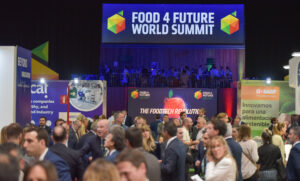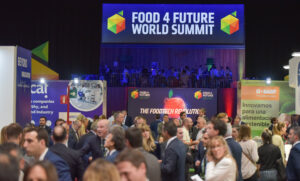The food industry faces the challenge of improving energy efficiency to reduce wastage and the carbon footprint of food production. Companies and experts showcased their latest technological solutions and innovations at the Food 4 Future World Summit to help address this challenge. The use of smart buildings, renewable energies, energy storage, and smart grids can respond to the challenge of improving energy efficiency in the food industry. By integrating renewable energies such as solar, wind, biogas, and hydro in food production processes, companies can reduce wastage, improve energy efficiency, and reduce their carbon footprint. Improvements in heating and cooling processes can lead to significant energy savings and greater sustainability in the food industry. Companies can learn how to improve energy efficiency in their production processes by using the latest technological solutions and innovations showcased at the Food 4 Future World Summit. Additionally, ICEX plays an essential role in promoting the internationalisation of Spanish companies and attracting foreign investment to Spain, thus strengthening the Spanish economy and creating new opportunities for growth and development.
Artificial Intelligence and Data Analytics, Key Tools for a More Efficient Food Industry
The use of technology to improve efficiency in production is becoming increasingly important in the food industry. Companies such as Campofrío, Glovo, AB Azucarera, Lerøy, Angulas Aguinaga or Grupo Apex are leading the way and will showcase their methods at the Food 4 Future World Summit. The summit is being held from 16-18 May in Bilbao, Spain and will host over 7,000 professionals and 380 experts from across the globe.
The summit will introduce the Plant Managers Summit, a new forum for plant and production managers in the food industry. The forum will explore how Artificial Intelligence and Big Data are improving workflow optimisation and efficiency in food production. Predictive maintenance, quality control, supply chain optimisation, energy optimisation and predictive demand forecasting are all areas where AI and data analytics are being applied. Juan Manuel López from Dassault Systems, Elisa Caballero from Glovo, and Idoia Olabarrieta from AZTI will explain how these technologies are benefiting the food industry.
Digital twins are also playing a significant role in plant maintenance and cost reduction. Ignacio Valero from LIS Data Solutions will discuss how managing processes in a preventive way using tools such as digital twins is leading to a leap in quality in production in the food sector.

Robotics and automation are also transforming the food industry by reducing waste, improving efficiency, and increasing product quality. Irene Ylla Monfort from Christeyns, Jesús Sanz from Campofrío, Aitor Duarte from Lerøy, and Jon Martínez from Inser Robótica will discuss how these technologies are being used to improve precision farming practices, food processing and livestock management, and supply chain management practices such as inventory control, transportation, and distribution.
The Food 4 Future World Summit is a vital event for anyone in the food industry looking to improve their production processes. With companies and experts from across the globe coming together to share knowledge and experience, it is an opportunity not to be missed.
Improving Energy Efficiency in the Food Industry: Insights from F4F – Expo Foodtech
The food industry is faced with the challenge of improving energy efficiency to reduce wastage and the carbon footprint of food production. At the Food 4 Future World Summit, experts from various companies and organizations shared their insights on how technology can help address this challenge.
Smart Buildings and Renewable Energies
Josu Aramburu from SENER and Luis Pérez Almeida from Igersoll Rand discussed the importance of energy efficiency in the food industry and how we can respond to the challenge through smart buildings, renewable energies, energy storage, and smart grids.
Agustín Pérez from Citrusvil and Gustavo Boillos from Grupo Apex presented success stories in the integration of renewable energies such as solar, wind, biogas, and hydro in food production processes, which have helped reduce wastage, improve energy efficiency, and reduce the carbon footprint of food production.
Improvements in Heating and Cooling Processes
Laura Alonso from Tecnalia and Garazi Inunciaga from AB Azucarera Iberia explained how improvements in heating and cooling processes can lead to significant energy savings and greater sustainability in the food industry. Insulation, heat recovery, energy-efficient refrigeration, and combined heat and power systems that generate both electricity and heat from a single energy source are some of the improvements being made in these processes. All of these contribute to reducing energy waste and improving energy efficiency in food production.
The Food 4 Future World Summit is an annual event organized by NEBEXT and AZTI that brings together over 8,000 visitors and 250 exhibiting firms to showcase the latest solutions in foodtech, robotics and automation, processing and packaging machinery for the different segments of the food industry, as well as in food safety and science. The summit is the largest European conference in which more than 450 international experts discover the latest trends, success stories, and tools to transform the food and beverage industry.
Improving energy efficiency is crucial for the food industry to become more sustainable and reduce its impact on the environment. With the latest technological solutions and innovations showcased at the Food 4 Future World Summit, companies can learn how to integrate renewable energies, improve heating and cooling processes, and reduce energy waste to improve energy efficiency in their production processes.
About ICEX: Promoting the Internationalisation of Spanish Companies
ICEX is a public business entity that aims to promote the internationalisation of Spanish companies. It operates under the Secretary of State for Trade of the Ministry of Industry, Trade, and Tourism. The mission of ICEX is to contribute to the competitiveness of Spanish companies, add value to the economy as a whole, and attract foreign investment to Spain. By helping Spanish companies expand internationally, ICEX is playing a vital role in strengthening the Spanish economy and creating new opportunities for growth and development.
Don’t miss interesting posts on Famousbio










